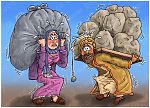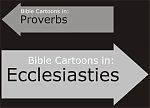Bible Cartoon: Proverbs 25v22 - Heap burning coals on head of enemy
Click on Add to cart button below shopping cart.
Purchased Bible Cartoons do not have watermarks. Links to Cartoons provided on email once purchase is completed.Bible Book: Proverbs
Bible Book Code: 2002502201
Scene no: 1 of 1
Bible Reference & Cartoon Description
Proverbs 25:22 (ANIV)
[21 If your enemy is hungry, give him food to eat;
if he is thirsty, give him water to drink.]
22 In doing this, you will heap burning coals on his head,
and the Lord will reward you.
DRAWING NOTES:
TIME OF DAY:
Not specified in Bible reference; daytime.
LIGHTING NOTES:
Simple lighting from above illuminates this scene.
CHARACTERS PRESENT:
A man (the “enemy” of the Proverb) carrying a tray of hot coals on his head.
RESEARCH/ADDITIONAL NOTES:
At first glance the idea of heaping burning coals on your enemy’s heap sounds like a vengeful act. If you took that view it would be difficult to reconcile Jesus’ command to love your enemy (see Matthew 5:43-48 *1, Luke 6:27-36 *2) with it.
I read a “Word for Today” (W4T) daily devotional on 03/October/2017, which gave a point of view that made a lot more sense to me regarding this apparent contradiction. Here’s a quote from the W4T devotion about the meaning of the idea of “heaping coals on your enemies head”:
“Charles Swindoll explains that in ancient days, homes were heated and meals were fixed on a small portable stove, somewhat like our outside barbecue grills. Frequently, a person would run low on hot coals and need to replenish his or her supply. The container was commonly carried on the head. So, as the individual passed beneath second-storey windows, thoughtful people who had extra hot coals in their possession would reach out the window and place them in the container atop their head. Thanks to the thoughtful generosity of a few folks, they would arrive at the site with a pile of burning coals on their head, and a ready-made fire for cooking and keeping warm. ‘Heaping burning coals on someone’s head’ came to be a popular expression for a spontaneous and courteous act one person would voluntarily do for another.”
[Source: http://www.ucb.co.uk/word-for-today-52330.html]
The Bible Knowledge Commentary has another interesting point to make:
25:21-22. Kindness to one’s enemy—giving him food and water—is like heaping burning coals on his head (quoted by Paul in Rom. 12:20). Sometimes a person’s fire went out and he needed to borrow some live coals to restart his fire. Giving a person coals in a pan to carry home “on his head” was a neighbourly, kind act; it made friends, not enemies. Also the kindness shown in giving someone food and water makes him ashamed of being an enemy, and brings God’s blessing on the benefactor. Compassion, not revenge, should characterize believers (cf. Prov. 24:29). Alternately, light on this passage may come from an Egyptian expiation ritual, in which a person guilty of some wrongdoing would carry a pan of burning coals on his head as a sign of his repentance. Thus treating one’s enemy kindly may cause him to repent.”
So, as you can see, the idea of “heaping burning coals on your enemies head” is not a reference to getting revenge, or getting even, or making your enemy suffer. It also isn’t about doing good to your enemy so that he feels bad and reforms his behaviour towards you either! It is all about genuine acts of thoughtful kindness, ie loving your enemy, regardless of how you have been treated. The Message version of the Bible (see *3 below) says “Your generosity will surprise him with goodness”, which is a better translation of what is meant in this passage. I’ve included the Amplified Bible reference to this proverb below (see *4) which further elaborates on its meaning.
“Heaping burning coals on your enemies head” is all about genuine acts of kindness towards him, regardless of how he has behaved towards you. Now I can see that Jesus’ commandment & Proverbs are not contradictory at all!
Bible References.
*1
Matthew 5:43-48 New International Version (NIV)
Love for Enemies
43 “You have heard that it was said, ‘Love your neighbor[a] and hate your enemy.’ 44 But I tell you, love your enemies and pray for those who persecute you, 45 that you may be children of your Father in heaven. He causes his sun to rise on the evil and the good, and sends rain on the righteous and the unrighteous. 46 If you love those who love you, what reward will you get? Are not even the tax collectors doing that? 47 And if you greet only your own people, what are you doing more than others? Do not even pagans do that? 48 Be perfect, therefore, as your heavenly Father is perfect.
*2
Luke 6:27-36 New International Version (NIV)
Love for Enemies
27 “But to you who are listening I say: Love your enemies, do good to those who hate you, 28 bless those who curse you, pray for those who mistreat you. 29 If someone slaps you on one cheek, turn to them the other also. If someone takes your coat, do not withhold your shirt from them. 30 Give to everyone who asks you, and if anyone takes what belongs to you, do not demand it back. 31 Do to others as you would have them do to you.
32 “If you love those who love you, what credit is that to you? Even sinners love those who love them. 33 And if you do good to those who are good to you, what credit is that to you? Even sinners do that. 34 And if you lend to those from whom you expect repayment, what credit is that to you? Even sinners lend to sinners, expecting to be repaid in full. 35 But love your enemies, do good to them, and lend to them without expecting to get anything back. Then your reward will be great, and you will be children of the Most High, because he is kind to the ungrateful and wicked. 36 Be merciful, just as your Father is merciful.
*3
Proverbs 25:21-22 (MSG)
21 If you see your enemy hungry, go buy him lunch; if he’s thirsty, bring him a drink.
22 Your generosity will surprise him with goodness, and God will look after you.
*4
Proverbs 25:21-22 (AMP)
21 If your enemy is hungry, give him bread to eat; and if he is thirsty, give him water to drink; *5
22 For in doing so, you will *6 heap coals of fire upon his head, and the Lord will reward you.
*5
Matthew 5:44, Romans 12:20
*6
This is to be viewed as a revengeful act intended to embarrass its victim, but just the opposite. The picture is that of the high priest (Leviticus 16:12) who, on the Day of Atonement, took his censure and filled it with “coals of fire” from off the altar of burnt offering, and then put incense on the coals to create a pleasing, sweet-smelling fragrance. The cloud of smoke of the incense covered the mercy seat and was acceptable to God for atonement.
Samuel Wesley wrote:
“So artists melt the sullen ore of lead,
By heaping coals of fire upon its head:
In the kind warmth the metal learns to glow,
And pure from dross the silver runs below.”





